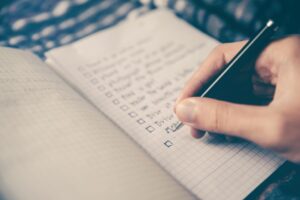I used to think I was a slow learner. Turns out, I was just using the wrong tools.

For years, I felt stuck. I wanted to change my life, to learn about health, build better habits, and grow in my faith, but every time I tried to learn something new, it felt like wading through mud. The information was overwhelming. The books were too long. My focus was non-existent. It seemed like everyone else was getting ahead while I was just trying to keep up.
Maybe you feel that way too. You have big goals. You want to learn a new language, master a skill for work, or finally understand a topic that fascinates you. But time is short, and your brain feels full.
I get it. When I decided to lose over 110 pounds, I had to learn a mountain of information about nutrition and fitness. I couldn’t afford to spend years figuring it out. I had to learn fast and apply what I learned immediately. That journey forced me to discover that learning isn’t about raw talent. It’s a skill. And like any skill, you can get better at it with the right techniques.
These aren’t magic tricks. They are simple, practical methods that help your brain work smarter, not harder.
Before You Even Start
You wouldn't build a house on a shaky foundation. The same goes for learning. A little preparation makes a huge difference. Before you dive into a book or a course, take a moment to set the stage for success. Think about why you are learning this. Is it for a new job? A personal passion? Connecting your learning to a meaningful goal gives you the fuel to keep going when things get tough.
25 Techniques to Learn Anything Faster
Don't let this list overwhelm you. You don't need to do all of them at once. Just read through them and see which ones stand out to you. Start with one or two.
- Know Your "Why." Before you start, ask yourself: Why am I learning this? Having a clear purpose is the best motivation.
- Find the 20%. The 80/20 Rule says that 20% of the material will give you 80% of the knowledge. Find the most important concepts and master them first.
- Create a No-Fly Zone. Put your phone in another room. Turn off notifications. A distraction-free space tells your brain it’s time to focus.
- Sleep On It. Your brain processes and stores information while you sleep. A good night's rest is one of the best study aids there is.
- Work in Sprints. I get my best work done in short, focused bursts of 2–4 hours. You can do the same with learning. Try 25-45 minutes of intense focus followed by a short break.
- Take Real Breaks. Don’t just switch from your textbook to your phone. Get up, stretch, walk around, or grab a glass of water. Give your brain a real rest.
- Chunk It Down. Don't try to memorize a whole chapter. Break it down into smaller sections or "chunks." Master one chunk before moving to the next.
- Ask "Why?" Like a Kid. When you encounter a new idea, ask "why?" multiple times. This helps you dig down to the root principle instead of just memorizing a surface fact.
- Use Analogies. Connect new information to something you already understand. For example, "A cell's nucleus is like the brain of the cell."
- Explain It to a Child (The Feynman Technique). Try to explain the concept in the simplest terms possible, as if you were teaching it to a kid. This quickly reveals what you don’t truly understand.
- Teach Someone Else. This is the ultimate test. When you teach something, you organize the information in your head and lock it in place.
- Practice Active Recall. After reading a page, close the book. Try to recall the key ideas from memory. This is much more effective than passive re-reading.
- Use Spaced Repetition. Review new information at increasing intervals. For example, review it after one day, then three days, then a week. This tells your brain the information is important.
- Take Notes by Hand. Writing things down by hand forces you to process and summarize. It’s slower than typing, but the learning sticks better.
- Draw It Out. Create a simple mind map, diagram, or sketch. Visualizing information helps you see the connections between ideas.
- Engage More Senses. Don’t just read. Read it aloud. Watch a video about it. Find a practical exercise to do. The more senses you involve, the stronger the memory.
- Make It Personal. Ask yourself: "How can I use this in my own life?" Connecting a concept to your own experiences makes it more memorable.
- Test Yourself First. Before you start a new topic, try to answer questions about it. This primes your brain to look for the answers you don't know.
- Read Like a Pro. Don’t just start reading from the first word. Skim the chapter first. Look at headings, subheadings, and summary paragraphs to get a map of the content.
- Listen and Learn. Use audiobooks or recorded lectures during your commute or while doing chores. It's a great way to fit more learning into your day.
- Apply It Right Away. If you learn a new feature in a software program, use it. If you learn a new word, try to use it in a sentence. Application turns knowledge into skill.
- Get Feedback. Don’t learn in a vacuum. Show your work to a friend, mentor, or teacher. Ask them, "Does this make sense?"
- Fuel Your Brain. Drink plenty of water and eat healthy food. Your brain is a physical part of your body. It needs good fuel to function well.
- Change Your Location. Studying the same material in a different place (like a library instead of your desk) can create new memory associations and improve recall.
- See Mistakes as Data. Every mistake you make is a signpost pointing to what you need to work on. It’s not a failure. It’s just part of the process.
A Note on Focus and Faith
For me, none of these techniques would have worked if my life was still in chaos. Overcoming my old habits of addiction and laziness wasn't just about willpower. It was about finding a deeper purpose. As I worked to strengthen my Christian faith, I found the clarity and discipline I’d been missing. My relationship with God gave me a powerful "why" that made the "how" so much easier. When you have a solid foundation, it’s amazing how much more you can build on top of it. True focus comes from a place of peace and purpose.
Learning doesn't have to be a struggle. It’s a joyful and exciting process when you have the right approach. You are capable of learning so much more than you think.
So, what’s one thing you’ve been wanting to learn? Look back at the list and pick just one technique. Try it this week. Take that first small step. You might be surprised at how fast you can go.





